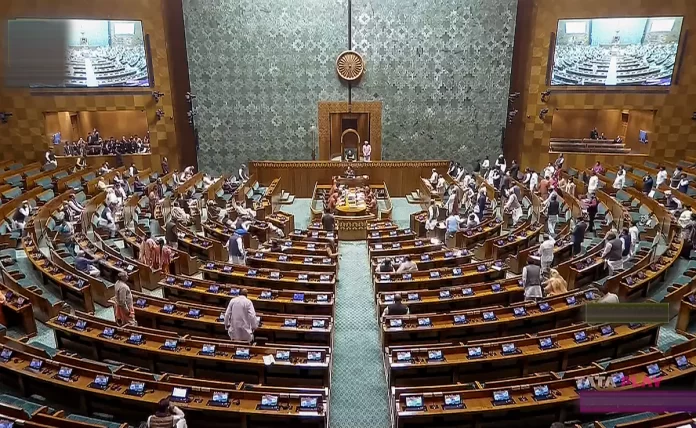– Mohd. Ziyaullah Khan
In a startling turn of events, the Lok Sabha recently witnessed the suspension of 143 Members of Parliament, setting a historical precedent for the Indian parliamentary system. The expulsion began with the removal of Ms. Mahua Moitra, a TMC MP, ostensibly for violating certain parliamentary rules of misconduct in her language and so forth. Subsequently, prominent figures like Farooq Abdullah, Shashi Tharoor, and others found themselves on the suspension list, raising critical questions about the government’s commitment to democratic principles.
The Suspensions
143 MPs suspended, reason too trivial to discuss the same at this juncture. However, the core issue leading to these suspensions revolves around the MPs’ inquiries regarding security and safety concerns in the newly constructed parliament building. These MPs were demanding the Home Minister to issue a clarification on the security glitches witnessed on 13th December. The government’s response, however, was the expulsion of these elected representatives, leaving a crucial question lingering: does the power vested in the government extend to suppressing the voices of elected officials representing the concerns of millions?
The suspension was justified by the official BJP Twitter (now X) handle, citing alleged mockery of the Vice President as the reason. However, this reasoning appears feeble, raising suspicions about the government’s intention to stifle dissent and Opposition voices. Each MP in the Lok Sabha represents a substantial portion of the population – approximately 1.5 million people. Suspending them not only undermines democratic values but also silences the very people they are elected to represent.
Targeting Opposition the New Normal in Modi Regime
Critics argue that the government, led by Prime Minister Narendra Modi, seems determined to create an Opposition-free environment, granting them unchecked power to govern as they please. The suspension of 143 MPs marks an unprecedented move, one that risks eroding the foundations of India’s proud democratic heritage. Ironically, the ruling party, the BJP, and its allies have a history of disruptive behaviour when they were in the Opposition during the UPA government. The recent mass suspension further tarnishes India’s image as the world’s largest democratic nation, as the government seems to be compromising the very essence of democracy.
Misuse of Government Agencies
The Modi government’s deployment of central agencies to target the Opposition raises concerns about the misuse of agencies like Enforcement Directorate (ED), Income Tax Department, and CBI to focus on the Opposition. This speaks volumes about how the current regime is allegedly targeting the Opposition. Interestingly, when the Opposition raised questions about why no action was taken against BJP leaders despite allegations of possessing significant wealth and property or criminal charges, the agencies were reportedly misused against Opposition leaders, particularly during the recently held elections in Rajasthan, MP, and CG.
The Role of Media
The pro-government media, often dubbed “Godi Media,” has played a significant role in supporting this apparent erosion of democratic values. The lack of widespread criticism from mainstream media outlets raises concerns about the state of freedom of the press in the country. Moreover, the government’s alleged association with individuals facing criminal charges has drawn criticism. Many BJP MPs and ministers in the cabinet reportedly have criminal records, yet remain unaccountable and continue to hold their positions. This glaring contradiction raises questions about the government’s commitment to upholding the rule of law and ethical governance.
The “Godi media” barely cares about raising issues found in the ruling party camps. The rest is being carried out by the IT cell, which is brushing a different image of the country, which people at large are believing on the name of the false claim that Modi Ji can never lie. The expulsion of Mahua Moitra, for what some deem a trivial reason of misconduct, further underscores the government’s intolerance towards dissenting voices. Interestingly, the media is busy maligning and vilifying the images of the Opposition leaders.
Opposition is Important in Democracy
Opposition is crucial in a democracy, and Prime Minister Modi Ji should recognize its significance. A robust Opposition serves as a check on the government’s power, fostering accountability and transparency. Differing viewpoints encourage healthy debate, leading to well-informed policies and decisions. Instead of targeting them, he should understand that a vibrant democracy thrives when diverse voices challenge, question, and contribute to the nation’s progress. The Opposition plays a vital role in representing varied interests, ensuring a balanced governance that reflects the collective will of the people. In acknowledging the importance of Opposition, Modi Ji should demonstrate commitment to upholding democratic values and fostering inclusive governance rather than targeting or suppressing them.
As this unprecedented event unfolds, it is imperative for the people of India to reflect on the values they want their democracy to uphold. The suspension of MPs raises a red flag, urging citizens to question whether they are comfortable with a government that seems determined to undermine democratic principles, potentially paving the way for an unchecked concentration of power reminiscent of a monarchy. Let democracy prevail!
[Mohd Ziyauallah Khan is a freelance content writer based in Nagpur. He is also an activist and social entrepreneur, co-founder of the group TruthScape, a team of digital activists fighting disinformation on social media.]




